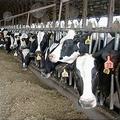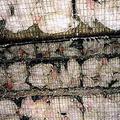 過去50年間,由於飼料、水及能源價格便宜,畜牧農業得以快速成長,使得美國每人平均食肉量要較其他國家高。然而,皮優工業畜產委員會(The Pew Commission on Industrial Farm Animal Production)29日已於報告中指出,未來這些資源將不再低廉,產業因此必須面臨轉型的命運。
過去50年間,由於飼料、水及能源價格便宜,畜牧農業得以快速成長,使得美國每人平均食肉量要較其他國家高。然而,皮優工業畜產委員會(The Pew Commission on Industrial Farm Animal Production)29日已於報告中指出,未來這些資源將不再低廉,產業因此必須面臨轉型的命運。
專責研究公共政策、動物醫學、公共衛生、農業、動物福利或農村社會等15位委員,自2006年便著手調查密集畜產對人類、動物及環境的影響。
這份名為《餐桌上放塊肉:美國的工業畜產(Putting Meat on the Table: Industrial Farm Animal Production in America)》的報告中,提供許多改革上建議,其中委員會主張發展一套善理農場廢棄物的新系統,以取代當前行效不彰的舊系統,藉以預防因不當的廢棄物處理,使美國人民遭受健康與環境的危害風險。
委員會建議國會與聯邦政府應共同研擬律法與規範,明訂出工業畜產與農場設施的廢棄物處理標準基礎。各州政府則可視其需要來施行嚴格規範。委員會建議這些程序必須立即啓動,且在10年的時間內完全落實。
委員會另一方面表示,工業畜產廢棄物處理的規範較適由各州的環保局負責,避免農業局內部引發推廣與規範限制之間的利益衝突。
為了降低密集畜產對公眾健康帶來的風險,委員會倡議集結「美國農業局」(U.S. Department of Agriculture, USDA)、「食品暨藥物管理局」(the Food and Drug Administration, FDA)、「美國環境保護局」(the U.S. Environmental Protection Agency) 及其他聯邦機構的力量,整合成「食品安全局」(Food Safety Administration),負責食品安全檢驗以提高全美食物供應的安全性。
 委員會指出,許多常見的傳染性疾病是透過人類與動物之間的接觸為傳播途徑;事實上,在1,400多件的人類病源體案例中,近約64%是屬於人畜共生傳染病。
委員會指出,許多常見的傳染性疾病是透過人類與動物之間的接觸為傳播途徑;事實上,在1,400多件的人類病源體案例中,近約64%是屬於人畜共生傳染病。
今日的農業已由往昔單一家庭管理的中小型開放式農場,轉型為大型經營且密集管理的農場,家畜被圈養在一棟棟排列整齊、為數眾多卻空間有限的農舍當中。委員們以經營型態的轉換為出發點,針對人畜共生疾病的傳播、公共衛生的威脅、環境惡化、動物福利以及農村的社會經濟影響等議題進行研究。
畜產的經營模式從放牧轉變成集中管理,也引起公民社會對業者對待家禽方式不人道的疑慮,亦興起人們對其肉禽福利的關切。
委員們建議政府一套近似實驗室所採用的動物福利監督系統。每項工業畜產設施應經由一個聯邦政府所委託授權的實體發照允可,且建議此實體由產業資助、經政府立案且為非營利目的之組織。消費者居中可扮演第三勢力,監督業者生產程序是否符合聯邦農牧動物福利標準。
委員會建議聯邦、各州及地方政府應開始蒐集空氣排放、地下與地表水排放、土壤排放與健康狀況報告(如心血管疾病、心臟病、意外傷害與過敏)等數據資料,如此也等同排除了廢棄物對消費者和農場僱工健康的可能影響。
委員會認為,這些蒐集而來的資料應立即建檔,並與全國工業畜產的資訊交流中心整合,以利於當局持續追蹤工業農場設施的廢棄物排放,並就此評估對公共衛生的衝擊。
不論這些建議規範多麼迫切,委員們也不免承認,報告中的多項建議,不免會增加業者的經營難度。
Animal agriculture has experienced "warp speed" growth over the last 50 years, due to cheap feed, water and energy. This has enabled Americans to eat more meat per person than any other society on the planet, but the industry will have to change as these resources become less available in the future, finds a report released today by The Pew Commission on Industrial Farm Animal Production.
Beginning in 2006, 15 commissioners, each with expertise in public policy, veterinary medicine, public health, agriculture, animal welfare, or rural society, undertook an exhaustive examination on the impacts to humans, animals and the environment of intensive food animal production.
Among the numerous recommendations in its report, "Putting Meat on the Table: Industrial Farm Animal Production in America," the Commission advocates a new system to deal with farm waste "that will replace the inflexible and broken system that exists today" and protect Americans from the adverse environmental and human health hazards of improperly handled waste.
Congress and the federal government should work together to formulate laws and regulations outlining baseline waste handling standards for Industrial Farm Animal Production, IFAP, facilities, the Commission recommends. States could choose to implement more stringent regulations if they considered them necessary. This process must begin immediately and be fully implemented within 10 years.
State environmental protection agencies, rather than state agricultural agencies, should be charged with regulating IFAP waste," the Commission says. "This would prevent the conflict of interest that arises when a state agency charged with promoting agriculture is also regulating it."
Addressing risks to public health from intensive farm animal production, the Commission recommends creation of a Food Safety Administration that combines the food inspection and safety responsibilities of the U.S. Department of Agriculture, USDA; the Food and Drug Administration, FDA; the U.S. Environmental Protection Agency and other federal agencies into one agency to improve the safety of the U.S. food supply.
Numerous known infectious diseases can be transmitted between humans and animals; in fact, of the more than 1,400 documented human pathogens, about 64 percent are zoonotic, the Commisson states.
The commissioners studied the spread of zoonotic diseases and other public health threats, environmental degradation, animal welfare concerns, and socioeconomic effects on rural communities as agriculture changed from the extensive system of small and medium-sized farms owned by single families to a system of large, intensive operations where the animals are housed in large numbers in enclosed structures.
This change from extensive to intensive animal food production has resulted in inhumane treatment of farm animals, which in turn has consumers worried about the welfare of the animals they eat.
The commissioners recommend a government oversight system similar in structure to that used for laboratory animal welfare. Each IFAP facility would be certified by an industry-funded, government-chartered, not-for-profit entity accredited by the federal government. Federal entities would audit IFAP facilities for compliance. Consumers could look for the third-party certification as proof that the production process meets federal farm animal welfare standards.
Human health of workers and consumers is addressed with a recommendation that the federal, state, and local governments should begin collecting data on air emissions, ground and surface water emissions, soil emissions, and health outcomes, such as cardiovascular disease, heart disease, injuries, and allergies.
The Commission recommends that these data be tabulated and combined with existing data in a national IFAP data clearinghouse that will enable agencies to keep track of air, water, and land emissions from IFAP facilities and evaluate the public health implications of these emissions.
However necessary, many of these recommendations may make life difficult for producers, the Commission acknowledges.
全文及圖片詳見:ENS



